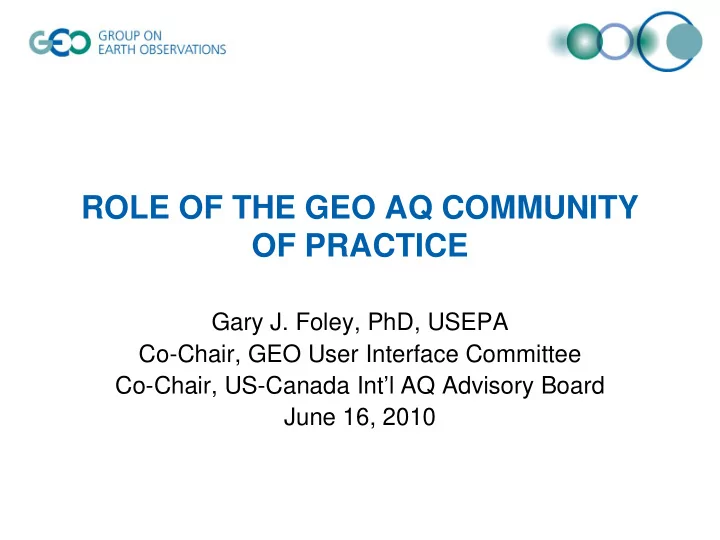

ROLE OF THE GEO AQ COMMUNITY OF PRACTICE Gary J. Foley, PhD, USEPA Co-Chair, GEO User Interface Committee Co-Chair, US-Canada Int’l AQ Advisory Board June 16, 2010
GEO 2005: Communities of Practice: The Theory
Communities of Practice are . . . Groups of people who share a concern, a set of problems, or a passion about a topic and deepen their knowledge by interacting on an ongoing basis Etienne Wenger Richard McDermott Bill Snyder Cult ultiv ivatin ing C Commun ommunit itie ies of of Pract ctice ice , Harvard Business School Press, 2002
Three characteristics are crucial: • Domain – the concern, interest or passion • Community – those who interact and/or value the interactions, often practitioners • Practice – members are practitioners that work toward some goal or outcome
Three characteristics are crucial: • Domain – the concern, interest or passion • Community – those who interact and/or value the interactions, often practitioners • Practice – members are practitioners that work toward some goal or outcome A community of practice is not just an interest group
CoP Classic Characteristics • Self-organizing, Informal • Many kinds of members: contributors, lurkers, newbies, facilitators, etc. • Voluntary, based on trust • Joint learning; Sharing of best practices; Reusable knowledge bases • Require more than just discussions • Interested in data/information infrastructures, interoperability, sharing, integration • Members distributed across many disciplines that share the common concern, interest or passion
GEO User Interface Committee in 2005: What conceptually would an AQ Communities of Practice look like?:
THE SPECTRUM OF USERS From observations AQ observations & AQ/ AQ/atmospheric scientists and atmospheric models modelers Data-to-Information AQ data managers and archiving & services providers Decision support tool Environmental process development modelers & researchers Decision making Policy Makers, Publ Health officials, AQ managers, Public officials, advocacy Assessment of benefits groups and the Public To societal benefits
A Conceptual Air Quality & Health Community of Practice (2005) The Public Communities Communities Exist but Only Have R&D & Have Limited Operational Interactions Activities in 2005
GEO 2010: Communities of Practice: The Status
Current GEO Communities of Practice • Air Quality • Geohazards • Biodiversity • Global Agricultural monitoring • Carbon Cycle • Health & • Coastal Zone Environment • Cryosphere • Integrated Water • Energy Cycle • Forests
Recent Presentations to the UIC 14 th Meeting, February 2010 • Carbon Community of Practice (R. Dargaville) • Energy Community of Practice (E. LeDrew) • Agriculture Community of Practice (J. S. Parihar) • Coastal Zone Community of Practice (H. P. Plag) • Water Community of Practice (R. Lawford) • The Way forward for the Cryosphere Theme (J. Key) • Air Quality Community of Practice (R. Husar) • Forest Community of Practice (M. Brady) • GeoHazards Community of Practice (S. Marsh)
What have we learned in GEO about global and local AQ so far? • For local AQ and health, it is 60 % community and 40 % technology to produce success – The public wants environmental information, but depends upon the community to interpret it – The community provides the context that lies between the data and the public, e.g. AIRNow Shanghai pilot • For transport, a good accomplishment is the linkage of WMO’s Sand & Dust Storm Warning System and MERIT’s Meningitis Decision Support Tool
Extra Slides
Public officials, Advocacy Groups and the Public • What do they care about? • Which environmental issues personally and/or professionally interest them? • What decisions do they regularly make and how do they get their information? • How would they assess the value if they could make better decisions?
Public Officials – What Benefits Might Interest Them? 1. The air is cleaner and safer to breath 2. Stimulate and encourage early adopters of new technologies 3. Widespread voluntary measures occur 4. Maintain the Country’s competitiveness (electricity and energy) 5. The Public is well-informed with real-time information, uses it & sees the benefits
The Public – What Benefits Might Interest Them? 1. The air is cleaner and safer to breath 2. How do I protect myself and my family when air pollution alerts occur? 3. What voluntary measures can I take? 4. How do my lifestyle & activities lead me and my family to greater involuntary risk? 5. How do my lifestyle & activities lead to greater pollution episodes and risk to my community? 6. How do I keep well-informed with real-time information and how should I use it?
Recommend
More recommend